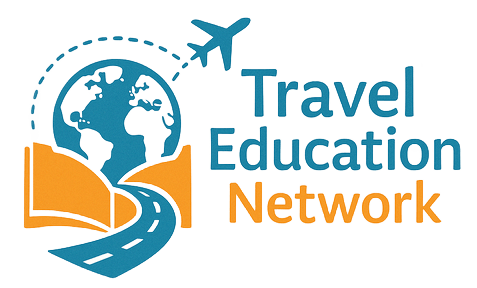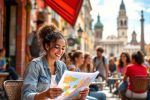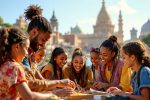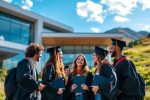How Education Affects Travel Choices and Cultural Understanding?
Discover how education shapes your travel adventures! From exotic destinations to relaxing getaways, your educational background influences your travel choices more than you think. Explore the link between education, travel frequency, spending habits, and the pursuit of enriching cultural experiences. Uncover the benefits of educational tourism, study abroad programs, and authentic travel experiences that broaden perspectives and foster intercultural competence. Embark on a journey of discovery and learn how to maximize your travel experiences based on your educational background.
Important information

- Education significantly shapes travel preferences, with more educated individuals often prioritizing cultural immersion, historical exploration, and personal growth during their trips.
- Highly educated travelers tend to travel more frequently, embark on longer journeys, and invest more in their travel experiences compared to those with less formal education.
- Educational tourism, including study abroad programs, offers immersive cultural experiences that foster intercultural competence, adaptability, and a nuanced understanding of global issues.
- Student travel cultivates essential life skills like communication, problem-solving, and critical thinking, while also promoting self-confidence, independence, and global awareness.
- Authentic travel experiences, such as homestays and community engagement, deepen cultural appreciation and create lasting memories, contributing significantly to personal and intellectual development.
How Education Level Influences Travel Choices
Education plays a significant role in shaping our travel preferences. Highly educated individuals often travel more frequently and embark on longer trips, spending more on their travel experiences. Their educational background often fosters an appreciation for culture and history, stemming from exposure to diverse perspectives.
The appeal of sampling local cuisine or exploring historical landmarks often resonates with more educated travelers. They seek immersive experiences and view travel as an opportunity for personal growth, impacting their travel frequency, destinations, and activities.
Travel Preferences Based on Education Level
- Highly Educated Travelers: often travel more frequently, take longer trips, spend more, appreciate culture and history due to diverse perspectives, seek immersive experiences, and view travel as personal growth.
- Less Educated Travelers: may prioritize relaxing getaways.
Impact on Travel Preferences and Behaviors
Individuals with extensive educational backgrounds often gravitate towards destinations rich in culture and history. They frequently engage in activities such as exploring museums and historical sites, and immersing themselves in local cultural events.
Those with less formal education may prioritize relaxing vacations focused on leisure and recreation. Factors influencing these travel preferences include exposure to diverse cultures, intellectual curiosity, and a desire for personal enrichment.
Cultural and Historical Destinations
Manila offers a wealth of cultural and historical experiences for the discerning traveler. Explore the walled city of Intramuros, a treasure trove of historical landmarks. Visit Fort Santiago, a bastion of history, and admire the architectural grandeur of San Agustin Church. Step back in time at Casa Manila, a glimpse into the past. Beyond Intramuros, discover the tranquil beauty of Rizal Park and delve into the rich collections of the National Museum Complex. For those seeking deeper immersion, educational tourism opportunities abound. Consider a study abroad program for an in-depth cultural exchange or explore other enriching cultural experiences that foster intercultural understanding.
Travel Spending Patterns
Well-educated individuals often prioritize travel, viewing it as an investment in personal growth and expanded horizons. They value the broadened perspectives gained through exploring new cultures and places, leading them to allocate more resources to these enriching experiences.
Educational Travel Programs and Their Outcomes
Studying abroad offers incredible benefits, immersing students in different cultures and strengthening their language skills while broadening their global understanding. These programs blend structured learning with cultural exploration. Students might attend classes and then explore local markets, developing intercultural competence through direct interaction with diverse communities and participating in local activities. Navigating unfamiliar social situations cultivates adaptability, enhances communication, and fosters empathy. Furthermore, studying abroad nurtures independence and self-reliance. The experience provides a unique opportunity for personal growth and academic enrichment, expanding horizons and preparing students for a globally interconnected world.
Study Abroad Programs
Study abroad programs offer incredible cultural immersion, transforming students into globally aware citizens. Connecting with diverse communities, students gain a deeper understanding of cultural differences and develop essential life skills. These cultural encounters broaden perspectives and foster positive changes in cultural attitudes, enhancing educational outcomes. Moreover, these experiences contribute to personal and professional growth. A student’s goals for cultural exchange significantly influence their experiences and the development of their cross-cultural skills. Participating in a study abroad program offers numerous benefits:
- Cultural immersion: Experience a new culture firsthand, fostering global awareness.
- Community connections: Engage with diverse communities, gaining a deeper understanding of cultural differences.
- Skill development: Develop valuable life skills through navigating unfamiliar environments.
- Broadened perspectives: Expand your worldview and challenge your own cultural assumptions.
- Enhanced education: Improve educational outcomes through experiential learning and cultural understanding.
- Personal growth: Develop greater independence, adaptability, and self-confidence.
- Professional development: Gain intercultural competence, a valuable asset in today’s globalized job market.
Promotion of Intercultural Competence
Studying abroad cultivates intercultural skills, enabling students to respectfully engage with diverse communities. Through these experiences, students learn to navigate cultural nuances and gain deeper insights into other societies. This intercultural competence is crucial for global citizenship and collaboration in diverse teams. Furthermore, these programs foster adaptability, open-mindedness, and cultural appreciation, vital qualities for addressing global challenges.
Student Travel and Its Influence on Cultural Competence
Travel provides students with unparalleled opportunities for growth, fostering cultural competence through authentic experiences. By connecting with local communities, students develop empathy and understanding, building valuable communication and adaptability skills. These immersive experiences are transformative, challenging preconceived notions and deepening cultural appreciation. Students gain a nuanced perspective, noticing subtle cultural differences while participating in local customs, thereby promoting cultural sensitivity. Navigating unfamiliar environments, while challenging, hones essential life skills. Students enhance their problem-solving and critical thinking abilities. Moreover, travel cultivates self-confidence, independence, global awareness, and a sense of responsibility. Ultimately, student travel is invaluable for personal and intellectual development.
Benefits of Student Travel
- fosters cultural competence through authentic experiences,
- develops empathy and understanding by connecting with local communities,
- builds valuable communication and adaptability skills.
Impact of Immersive Experiences
- transforms perspectives, challenging preconceived notions,
- deepens cultural appreciation and sensitivity,
- allows students to gain nuanced perspectives by noticing subtle cultural differences.
Skills Developed Through Travel
- essential life skills, including problem-solving and critical thinking,
- enhanced self-confidence and independence,
- cultivates global awareness and a sense of responsibility.
Overall Value
Student travel offers invaluable personal and intellectual development.
Authentic Travel Experiences
Authentic travel immerses students in local cultures, fostering intercultural growth and offering firsthand experiences of diverse lifestyles. Imagine living with a local family, participating in a vibrant festival, or volunteering for a community project. These opportunities broaden perspectives, cultivate understanding, and create lasting memories. However, thorough planning ensures a meaningful and respectful cultural exchange. Here’s how to plan your authentic travel experience:
Research your destination. Learn about the local customs, traditions, and social etiquette. Understanding the cultural nuances will help you navigate interactions respectfully.
Choose meaningful activities. Select activities that align with your interests and allow you to engage with the local community. Consider homestays, language exchange programs, or volunteer opportunities.
Pack appropriately. Dress respectfully and in accordance with local customs. Pack light, bringing only essential items, and be mindful of the local climate.
Learn basic phrases. Knowing basic greetings and phrases in the local language demonstrates respect and facilitates communication. Even a few words can go a long way.
Be open-minded and flexible. Embrace unexpected situations and be adaptable to different ways of life. Authentic travel involves stepping outside your comfort zone.
Immersive Cultural Experiences
Immersive cultural experiences offer powerful learning opportunities, connecting students directly with local communities. For example, participation might involve living with a host family, volunteering, or joining cultural events. These hands-on experiences foster a deeper understanding of diverse lifestyles, traditions, and perspectives. Students cultivate valuable skills such as empathy, adaptability, and cross-cultural communication. Research, including a University of Michigan study, confirms these benefits, demonstrating that immersive study abroad programs significantly enhance intercultural competence and students’ ability to navigate diverse cultural settings. These programs bridge the gap between theoretical knowledge and real-world application, fostering personal growth and a global perspective.
Developing Essential Life Skills
Authentic travel cultivates adaptability, empowering students to navigate unfamiliar situations and devise creative solutions.
Immersive cultural experiences foster empathy by exposing students to diverse perspectives and lifestyles.
Moreover, these enriching encounters nurture intercultural competence, facilitating effective communication and collaboration in diverse environments.
These valuable skills are essential in today’s interconnected world.
The Role of Educational Tourism in Cultural Understanding
Educational tourism fosters global citizenship by immersing individuals in diverse cultures, offering transformative experiences. Through direct interaction with different communities, travelers gain cultural awareness and learn about various traditions firsthand, leading to both personal and professional growth. This broadens perspectives and improves intercultural competence. Students also develop essential life skills and a deeper understanding of global issues. These travel experiences can be transformative, leading to self-redefinition and a nuanced appreciation for cultural diversity. The benefits of educational tourism include:
- gaining cultural awareness,
- developing essential life skills,
- improving intercultural competence, and
- experiencing personal and professional growth.
Fostering Global Citizenship
Educational tourism empowers university students to become global citizens, fostering awareness of their roles in an interconnected world. By experiencing diverse cultures and perspectives, students gain a deeper understanding of our shared humanity.
International volunteer projects and service-learning trips equip students to address global challenges while cultivating cultural humility and open-mindedness. Through interacting with different cultures, cuisines, and customs, students develop empathy and appreciate diversity.
Students recognize their place within the larger global landscape, fostering a sense of global citizenship. Experiencing diverse cultures and perspectives firsthand allows students to gain a deeper understanding of our shared humanity.
Increasing Cultural Awareness
Educational tourism fosters cultural understanding through immersive experiences. Students connect with diverse communities, learning about different traditions firsthand. This direct interaction cultivates empathy and a nuanced global perspective. For example, students might explore local history, participate in cultural events, and engage with community members. These invaluable experiences broaden their understanding and appreciation for diverse cultures.
Impact on Personal and Professional Growth
Educational tourism offers numerous benefits, fostering personal growth by building self-confidence and adaptability. These enriching experiences cultivate valuable intercultural communication skills, essential in today’s interconnected world. A strong travel history distinguishes a resume, making graduates more competitive job candidates. Furthermore, educational trips offer invaluable networking opportunities, sparking exciting collaborations and boosting career prospects.
How Educational Travel Opens Eyes to Diverse Cultures
Educational travel offers immersive cultural experiences where students witness different customs firsthand and learn about new traditions and ways of life, fostering a deep appreciation for diversity. Immersing yourself in new cultures challenges preconceived notions, broadens perspectives, and encourages critical thinking. Reflecting on your own culture and empathizing with others fuels personal growth and creates a nuanced understanding of the world.
Benefits of Educational Travel
- Cultivates global citizenship by fostering intercultural competence and promoting respect.
- Connects students with diverse communities, allowing them to learn about global issues and develop a sense of belonging in our globalized world.
Skill Development Through Travel
- Students gain essential skills such as adaptability, improved communication, and honed problem-solving abilities within diverse cultural contexts.
- Offers unique learning that goes beyond textbooks and classrooms through direct engagement with different cultures, creating a deeper appreciation and understanding of cultural nuances and complex issues.
Broadening perspectives is transformative. Cultural encounters during educational travel facilitate this process by interacting with diverse people, which develops empathy, challenges assumptions, and promotes tolerance, leading to greater open-mindedness and global awareness.
Experiencing Diverse Cultures
Educational travel unlocks new cultures and provides firsthand experiences, boosting global awareness. Students learn about diverse lifestyles, broadening their perspectives and fostering cultural understanding. Engaging with local communities builds empathy and an appreciation for diversity, fueling personal growth and a deeper understanding of global interconnectedness.
Manila’s Cultural Gems
Manila offers a wealth of cultural attractions.
- Explore the Cultural Center of the Philippines.
- Visit the Ayala Museum.
- Discover the vibrant street art of Binondo.
- Immerse yourself in the National Museum complex.
Experiencing Filipino Culture
Participating in local festivals and enjoying the cuisine enhances cultural immersion.
- Partake in the Pahiyas festival.
- Experience the energy of the Ati-Atihan festival.
- Savor traditional Filipino cuisine.
Ultimately, any destination provides unique learning opportunities, and educational travel promotes personal development—a powerful way to learn about the world.
Broadening Perspectives through Cultural Encounters
Immersing yourself in different cultures is a truly mind-opening experience, providing firsthand insights into diverse ways of life. This not only challenges preconceived notions but also fosters empathy, highlighting our interconnectedness. Studies even link cultural exposure to increased tolerance. Moreover, such encounters offer invaluable personal growth opportunities, cultivating a more nuanced perspective on the world.















